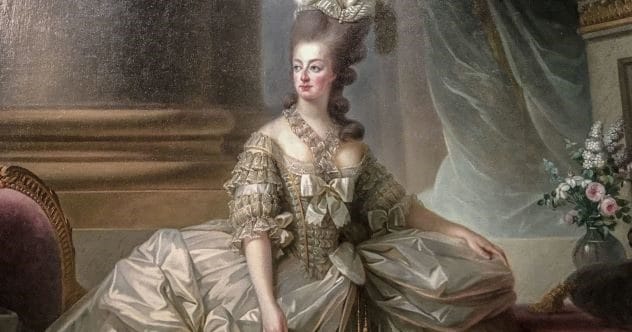Of all the figures linked to the French Revolution, Marie Antoinette stands out. Jacques-Louis David’s sketch of her execution is iconic, a stark contrast to her usual opulent portraits. Born Maria Antonia of Hapsburg in 1755, she married the future Louis XVI in 1770, becoming Marie Antoinette. She died at 37, a casualty of the revolution.
A Pawn in the Hands of Powerful Men
Had she been born at a different time, Marie Antoinette might have led a typical royal life. She was, by many accounts, quite ordinary. But she was born during a crucial period of Franco-Austrian relations. Her mother sent her to France at 14 to promote Austrian interests, a challenging task in a hostile court. Her life and reputation were largely controlled by powerful men, starting with her husband. [1]
France’s Problems Had Begun Long Before Her Arrival
France’s troubles predated Marie Antoinette. Louis XV’s reign was marred by mistresses and undermined the crown’s reputation. Provincial bodies resisted royal policy, hindering fiscal reforms. Farming methods remained outdated, causing food shortages and high prices. The nobility avoided taxes and opposed reforms. These issues were beyond the control of a queen consort. [2]
Primary Target of Xenophobia
Eighteenth-century Europe was not open to foreigners. Marie Antoinette’s German heritage and gender made her a target. Austria and France had been rivals for centuries before her marriage to Louis XVI, which aimed to foster friendship. Balancing loyalty to Austria with her role as future queen of France was difficult. Accusations of disloyalty plagued her until her death. [3]
Became Queen Far Too Young
Marie Antoinette became queen at 18 after Louis XV’s death. The state’s finances were dire, and she hadn’t yet produced an heir. Both she and Louis XVI were overwhelmed. She spent her early queenship playing favorites and spending lavishly, damaging her reputation. [4]
She Had No Real Power as a Consort
Despite being portrayed as influential, Marie Antoinette held no administrative power. As a consort, she was not queen in her own right. The government was led by Louis XVI. In 18th-century France, a king’s wife holding power was unacceptable. She was a woman, and a foreigner from a rival royal house. [5]
Not the Deficit-Causing Spendthrift She Was Portrayed to Be
Versailles was opulent, and Marie Antoinette was part of that world. However, court expenditure was a small fraction of national spending. Even if she had spent nothing, it wouldn’t have solved France’s financial problems or prevented the revolution. [6]
Suffered for Her Husband’s Poor Decision-Making
Louis XVI was ill-suited for kingship. He agreed to help the American War of Independence, worsening the kingdom’s debt. Marie Antoinette was often excluded from policymaking, despite proving more capable than her husband. His indecisiveness and depression contributed to the calamitous situation. She ultimately paid for this union with her life. [7]
Demonstrated Committed Loyalty to France and Her Husband
Marie Antoinette was initially called “the Austrian” but spent most of her life in France. She prioritized her children’s interests over those of her family in Austria. She insisted on staying by her husband’s side during the revolution. She even took charge of an escape plan, but the family was caught and returned to Paris. [8]
Never Said “Let Them Eat Cake”
The quote “Let them eat cake” is falsely attributed to Marie Antoinette. There’s no proof she said it. Similar statements have been linked to others throughout history. By the time of the monarchy’s downfall, she was heavily vilified. The quote wasn’t referenced in contemporary materials and only appeared decades later as a rebuttal. [9]
Withstood a Merciless Campaign of Bad PR
Marie Antoinette was an early victim of character assassination. The monarchy had already lost some prestige. Over two decades, she faced a barrage of libelous propaganda. Accusations were scandalous and often sexual. She was portrayed as a spy, adulteress, and nymphomaniac. The state’s financial woes were blamed on her. Her own son was coerced into accusing her of molestation. [10]
Marie Antoinette’s story is a complex mix of historical context, personal failings, and targeted slander. She was a young queen in a troubled time, facing challenges beyond her control. The relentless campaign against her distorted her image, contributing to her tragic fate.
What do you think about Marie Antoinette’s story? Leave your comment below!










